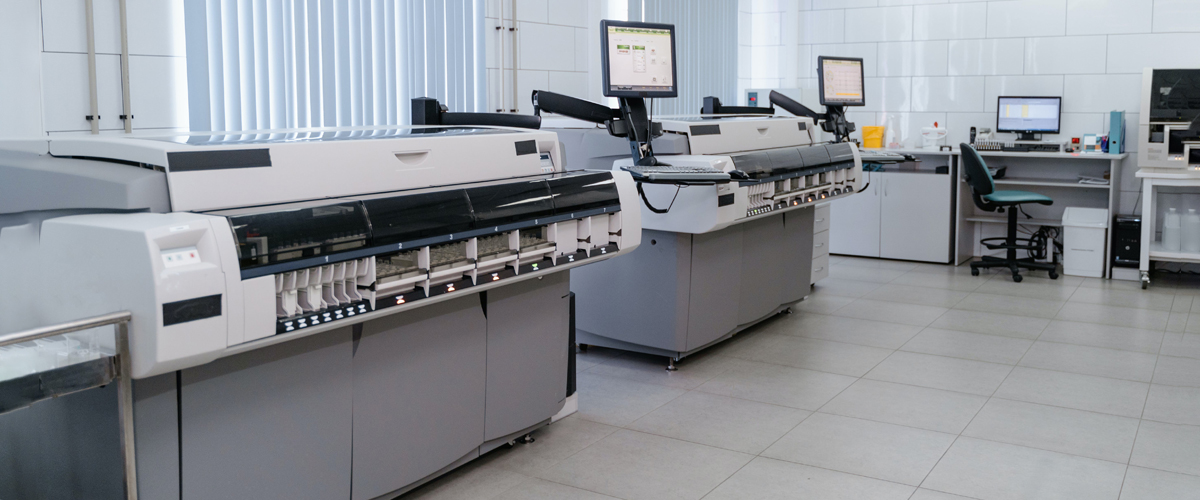Home » Lab floors
Lab floors
- Publicatie datum January 30, 2024
- Auteur Joost van Hulst
- Laatst aangepast January 30, 2024
 800
800 As a specialist in floor installations for the business market, we understand better than anyone the importance of high-quality lab floors. Our floor systems are designed to meet the specific requirements of laboratory environments, where precision and safety are central.
Selecting a suitable floor for a laboratory does not happen overnight. It is important to know the needs and requirements of the room and choose a suitable floor based on that.
What are the minimum properties that lab floors must meet?
Lab floors must meet strict requirements to function in a laboratory environment. They must, among other things:
- Be chemically resistant to provide resistance to acids, bases and solvents;
- Be non-slip to ensure employee safety even in humid conditions;
- Resistant to wear and pressure to ensure durability;
- Be seamless to prevent the ingress of liquids and to promote hygiene;
- Being electrostatically conductive or dissipative in the case of sensitive electronics.
Which floors are suitable as a lab floor?
ICM Projects offers various types of lab floors that meet the above requirements. Below you will find an overview of our most popular lab floors:
ESD floor
ESD floors are ideal for laboratories where sensitive electronics are used. This special floor type prevents electrostatic discharges that can cause damage to both electronic components and employees.
With an ESD floor you create a safe working environment for staff and protect your valuable equipment.
Cleanroom floor
A cleanroom floor provides a controlled environment with minimal particle spread. This floor is completely seamless and can be finished with coved skirting boards to prevent dirt accumulation.
This is crucial in laboratories where precision and sterility are of great importance. Consider, for example, laboratories where research is conducted into micro-organisms.
Liquid proof floor
Liquid-tight floors offer optimal protection against the penetration of liquids, chemicals and other substances that can be harmful to both the floor and the environment.
Since chemicals are often used in laboratories, a seamless, liquid-tight floor is essential to prevent the penetration of (harmful) liquids.
Trowel floor
A trowel floor is a strong and durable floor that can withstand heavy loads. This floor is therefore often used in laboratories where heavy equipment is used.
Additionally, trowel floors provide excellent protection against chemicals, making it a perfect candidate for lab floors.
Linoleum floor
Linoleum floors are natural, durable and easy to maintain. They offer a hygienic and comfortable solution for laboratories and can be provided with extra protection. For example, the floor can be finished with coved skirting boards to prevent dust accumulation,
Epoxy floor
Epoxy floors are extremely durable, chemically resistant and easy to clean. They are ideal for laboratories where heavy chemicals are used and can be used in various ways.
Depending on the specific needs and requirements of the room, you can opt for an epoxy cast floor or an epoxy floor coating. For example, for rooms that require more load-bearing capacity, an epoxy cast floor is a better choice.
In which rooms can laboratory floors be used?
Our lab floors can be used in various laboratory spaces, including:
- Analysis rooms
- Cleanrooms
- Chemical laboratories
- Microbiological laboratories
- Medical laboratories
Discover the high-quality lab floor of ICM Projects
At ICM Projects we supply high-quality lab floors that meet the strictest standards. Our experienced professionals ensure a professional installation, where quality and precision come first. Please feel free to contact us for tailor-made advice without obligation.
For which rooms are lab floors mandatory?
In some cases lab floors are mandatory. For example, in laboratories where hazardous substances are used, such as in the production of medicines or chemicals.
A lab floor is also mandatory in laboratories where micro-organisms, such as bacteria and viruses, are used. This is to prevent these substances from accumulating in seams and cracks in the floor and thus posing a risk to the health of employees.
How long does it take to install a laboratory floor?
In general, installing a lab floor takes between 2 and 5 days. This includes preparing the subfloor, applying the primer and finishing the floor.
However, the final installation time of a laboratory floor will depend on several factors, such as the size of the room and the type of flooring being installed.
What do laboratory floors cost on average?
The average costs for a lab floor are between €50 and €150 per square meter. However, it is wise to request a no-obligation quote to receive an accurate quote.
The costs for a laboratory floor depend on various factors, such as the type of floor that is installed, the size of the room and any additional options, such as coved skirting boards.
OVER DE AUTEUR
Purchasing a company floor does not happen overnight. A good floor is only the basis for high work performance if you and your colleagues function optimally in it. For that simple reason, CEO Joost van Hulst makes sure every project runs smoothly every day. We get to the bottom of things for our clients. From administrative offices to hospitals. Ready to perform? The floor is yours.